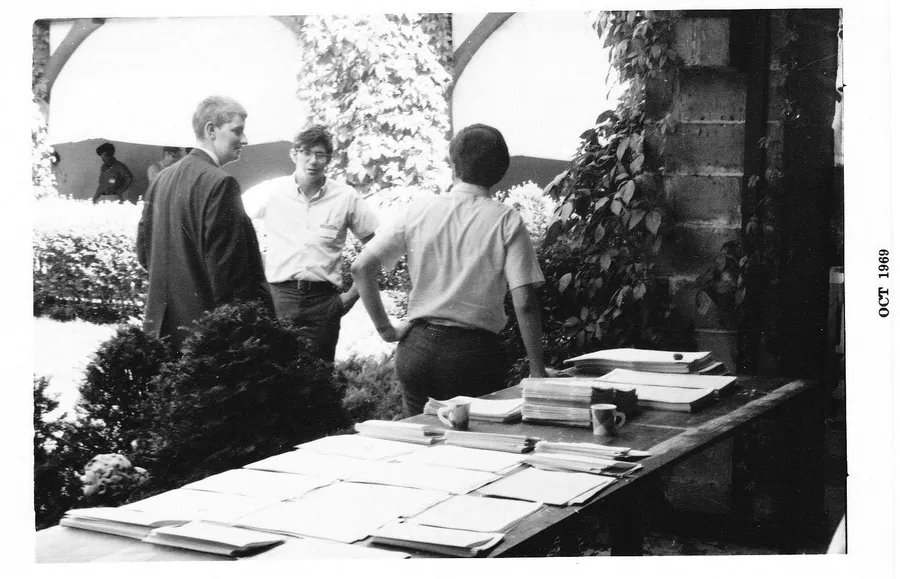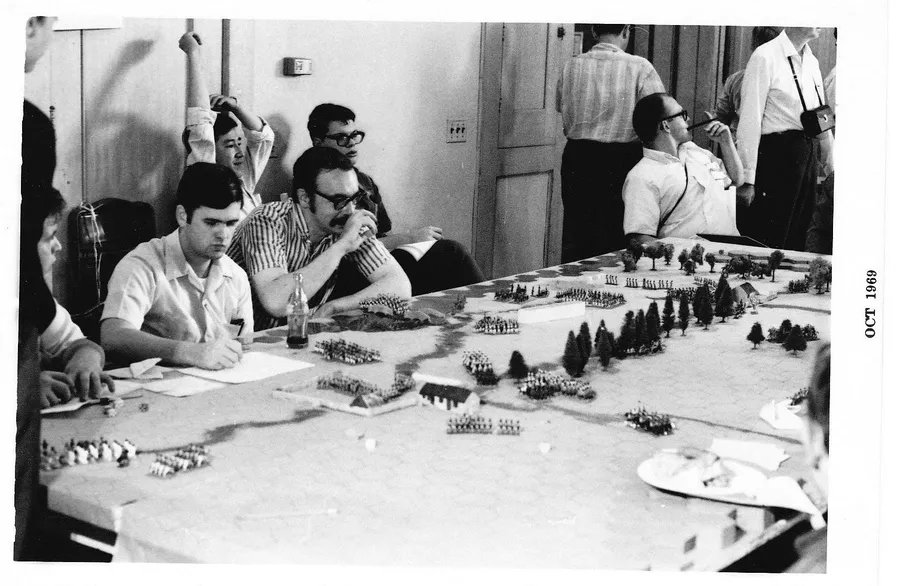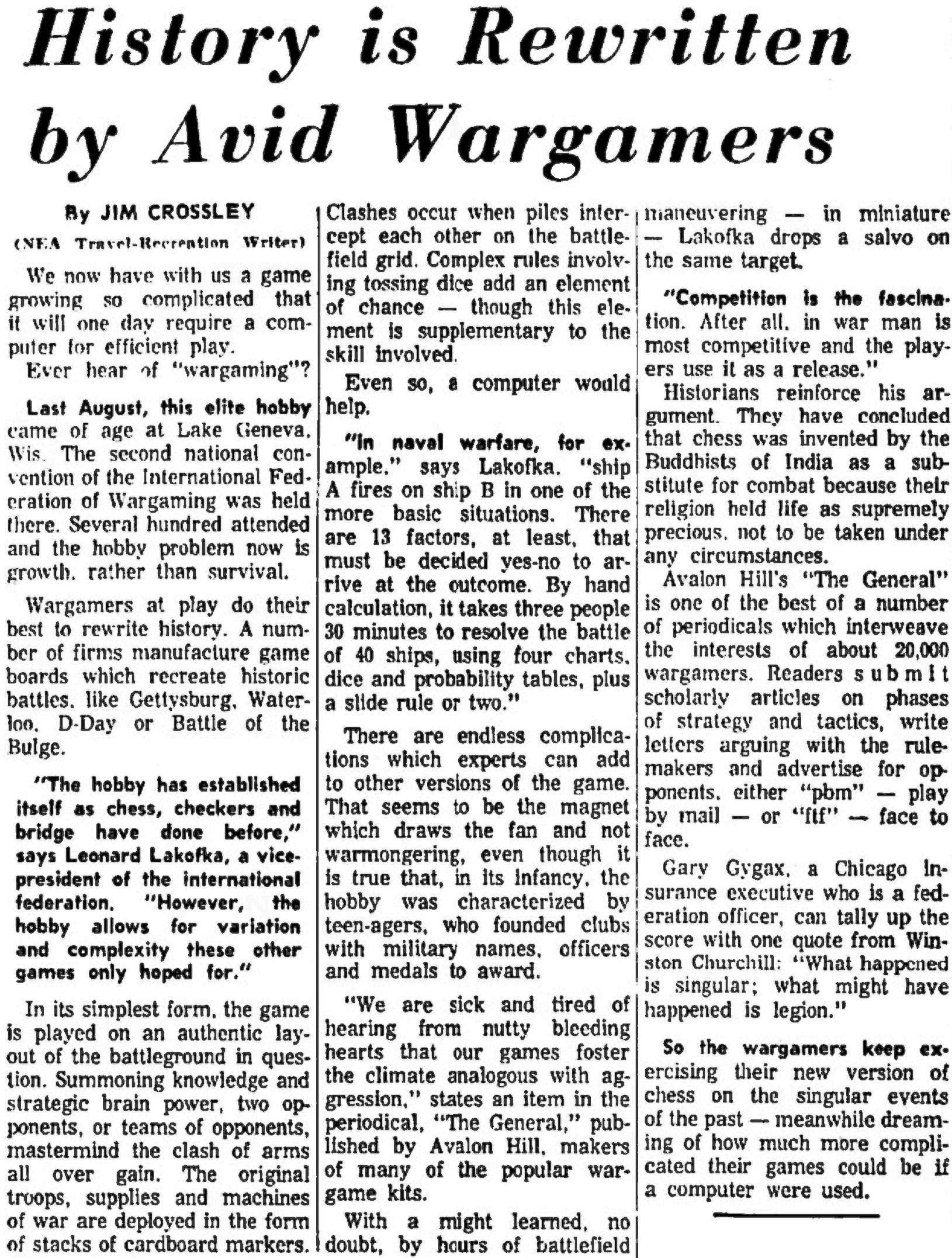Gygax and Lakofka on Wargaming in 1969
I’ve been scanning a lot of old cookbooks lately; while I’ve written a script to help streamline the process, the scanning itself is limited to the time it takes the scanner to draw in each page, page by page… by page… by page. This leaves me bored for very short periods during every scan.
This morning as I write this, I used that time to search on some of the related vintage cooking topics that interest me: Eddie Doucette, and quiet ovens. But having exhausted that, and because I’d just finished putting The Cult of Gygax to bed, I typed “Gary Gygax” into newspaper.com’s search field.
It is apparently an uncommon name. Almost all of the hits were for the Gary Gygax we’re familiar with. I was surprised, however, to see hits from 1969. It turns out to be a fascinating wire article1 that appeared over the 1969-1970 holiday season, predating Dungeons and Dragons. All of the hits were for that one article; it’s the only hit on his name pre-Dungeons and Dragons.
| Game Provides the Way To Shape Our History | The Sedalia Democrat | Dec 22, 1969 |
| History Is Rewritten By Avid Wargamers | The Waxahachie Daily Light | Dec 23, 1969 |
| History is Rewritten by Avid Wargamers | Carroll Daily Times Herald | Dec 24, 1969 |
| Wargamers Replay Historic Battles to New Conclusions | Beckley Post-Herald/Raleigh Register | Jan 4, 1970 |
| History Being Rewritten By ‘Wargamers’ | Colorado Springs Gazette-Telegraph | Jan 10, 1970 |
Newspapers.com doesn’t archive every newspaper, and their OCR is often incorrect, so it probably appeared in others as well. For example, two of the newspapers above didn’t come up in my initial search for Gygax, but only when I did a search on the author of the piece, Jim Crossley, to see if he’d written other articles on gaming. Which he appears to have not.
The article’s subjects are members of the International Federation of Wargaming, which held its “second national convention” in August 1969. More specifically, the interviewees were Gary Gygax, of course, since that was my search term, and also “Leonard” Lakofka. Len Lakofka’s name is spelled “Leonard” in each of the articles. These articles are the only appearance of the name “Leonard Lakofka”, “Lenard Lakofka”, or “Len Lakofka” in all of newspaper.com’s archives. Gygax, of course, has more hits once D&D hits the market.

GenCon 1969 registration and information desk (Alistair William on the left).
The article has a strange framing device for 1969, about the future computerization of wargaming. Crossley opens and closes the article highlighting the participants’ desire for computerization. But there’s nothing about computerization or computers at all in the quotes and paraphrases from Lakofka and Gygax. Lakofka does mention using “a slide rule or two”, but there’s no mention of preferring a computer or even knowing it’s a possibility.2
The articles were re-entered manually at each newspaper: they each contain typos, but they contain different typos. And at least one, the Beckley Post-Herald, appears to have used some form of automated layout. Full justification in that newspaper is maintained by adding spaces between letters in a way that I can’t imagine a human doing.

I can’t imagine a human not realizing they could use a hyphen to break up “Waterloo” rather than spread out “Gettysburg” like that. Even more interesting, while it’s understandable that “Waterloo” might not be in an early computer’s spelling dictionary, and that “maneuvering” would be a form of the word an early computer might not be able to hyphenate, “miniature” seems to be in it but not well. The hyphen is after the “mi” rather than after “mini” or “minia”, requiring a similar heavy spacing of “maneuvering” at the start of the line.

I’m not sure whether “rule-makers” was a hyphenated term in the original or if it is only hyphenated for layout purposes, because each of the five versions of the article places “rule-” at the end of a line.
Each article is, barring typos, identical. None of the newspapers that reprinted it altered the copy to fit the space needed. In my very limited experience with newspapers and wire copy, this is slightly odd. This looks a lot like a filler article to me, and the whole point of filler articles is to fill an available space. The filler article doesn’t get to push other articles out of the way. The filler article is edited to the needs of the space.

“Gary Gygax at GenCon in 1969 playing Napoleonic miniatures using Frappe.”
Given the similarity between the titles, with three of the four involving rewriting history, there was probably a suggested title from Jim Crossley or the Newspaper Enterprise Association.
The NEA is a Chicago-based syndication service, and Crossley, or a Crossley, has several bylines under the NEA banner on various topics from camping to antiquing. Here, he’s listed specifically as the “Travel-Recreation Writer”.
I can’t find for certain who Jim Crossley is, but I suspect he’s the Jim Crossley who wrote British Destroyers 1892-1918 and several other military history books. That Crossley is in the Osprey Games contributor index and the Pen & Sword Books author index.
If they’re the same person, Crossley obviously has an interest in wargaming, or at least wars and the military in general. Was he a member of the International Federation of Wargaming, too?
The implication in the article is that the International Federation of Wargaming’s second annual convention was last August, in 1969. Wikipedia implies that the second convention was in 1968, “a year later” from the first in 1967. It may be that the article meant that this was the second Lake Geneva Wargames Convention, that is, the second of the cons held in Lake Geneva. The first IFW con was in Malvern, Pennsylvania, in 1967. But the first IFW con handled by Gygax in Lake Geneva was in 1968. That was the first “GenCon”. The second was 1969.
IFW was the successor of a group called “United States Continental Army Command”, which sounds a lot like the vaguely-derided “teen-agers, who founded clubs with military names, officers and medals to award” in the “infancy” of wargaming.
Wargaming did indeed benefit from computerization, and one of the early marketers of computer wargames was Avalon Hill. Computerized wargaming would look nothing like how Crossley appears to have imagined it in 1969. Instead of a disinterested judge to take the drudge out of tabletop wargaming calculations, computerized wargaming took over the entire process, supplanting the tabletop.
But computerized wargaming would itself be completely overshadowed by computerized roleplaying. In 1969, these two gamers were looking forward to a wargaming future whose “problem now is growth, rather than survival”. In only a few years, both of them would be instrumental in founding a completely new kind of game that would siphon off any momentum wargaming might have had and revolutionize a home computer industry that also hadn’t been created yet!
In response to On a Cult of Gygax: The extent and even existence of a “Cult of Gygax” is greatly exaggerated, to the point where even things that directly contradict the theory are interpreted as supporting it. The cult of Gygax is a self-perpetuating myth.
- December 24, 1969: History is Rewritten by Avid Wargamers
-
(NEA Travel-Recreation Writer)1
We now have with us a game growing so complicated that it will one day require a computer for efficient play.
Ever hear of “wargaming”?
Last August, this elite hobby came of age at Lake Geneva, Wis. The second national convention of the International Federation of Wargaming was held there. Several hundred attended and the hobby problem now is growth, rather than2 survival.
Wargamers at play do their best to rewrite3 history. A number of firms manufacture game boards which recreate historic battles, like Gettysburg, Waterloo, D-Day or Battle of the Bulge.
“The hobby has established itself as chess, checkers and bridge have done before,” says Leonard Lakofka, a vice-president of the international federation. “However, the hobby allows for variation and complexity these other games only hoped for.”
In its simplest form, the game is played on an authentic layout of the battleground in question. Summoning knowledge and strategic brain power, two opponents, or teams of opponents, mastermind the clash of arms all over again4. The original troops, supplies and machines5 of war are deployed6 in the form of stacks of cardboard markers.
Clashes occur when piles intercept each other on the battlefield grid. Complex rules involving tossing dice add an element of chance — though this element is supplementary to the skill involved.
Even so, a computer would help.
I think I’m getting the terminology right for an article published in multiple newspapers via a syndication service. I get almost all of my knowledge of how newspapers work from Carl Kolchak.
↑I’m sure Lakofka did know it was a possibility—anyone in modern-era wargaming at that time would. But the article doesn’t reflect that.
↑
International Federation of Wargaming
- International Federation of Wargaming at Wikipedia
- “Founded by Bill Speer, Gary Gygax, and Scott Duncan in 1967, the International Federation of Wargaming (IFW) was a wargaming club operated from 1967 to early 1970s. It emerged as a successor to an earlier club called the United States Continental Army Command, founded by Speer.”
- International Federation of Wargaming at Board Game Geek
- “There are a number of old timers on BGG and I’m curious just how many can claim membership in the old IFW. Please feel free to share your memories and pictures!”
- Scott Duncan interview at Best 50 Years in Gaming
- An interview with Scott Duncan, one of the founders of the International Federation of Wargamers. “I was at Gen Con 1, the first one, and I was at Gen Con 5 when they moved from Lake Geneva to the University for a short while. And then this 50th one is the first one I’ve been to since then.”
Jim Crossley
- Osprey Games: Jim Crossley
- “Author of: British Destroyers 1892-1918.”
- Pen & Sword Books: Jim Crossley
- “Jim Crossley read Modern History at Cambridge. He has had a lifelong interest in naval affairs. He is himself a keen sailor and springs from a family with a long naval tradition. His own father was a midshipman on the battleship Resolution in 1916 and his mother was a cousin of Commodore William Goodenough, one of the central figures in the Jutland battle.”
my hobbies
- A home-cooking handful from Eddie Doucette
- A glimpse at a long-lost 1954 Chicagoland television cooking show, including recipes. They were typed by a viewer, so some of them require creative interpretation.
- On a Cult of Gygax
- The extent and even existence of a “Cult of Gygax” is greatly exaggerated, to the point where even things that directly contradict the theory are interpreted as supporting it. The cult of Gygax is a self-perpetuating myth.
- Promotional Cookbook Archive
- I’ve managed to acquire several old promotional pamphlets and cookbooks that don’t appear to be available elsewhere on the net. I’m making them available here.
- What temperature would a “quiet oven” be in old fashioned temperature vocabulary? at Seasoned Advice (Stack Exchange)
- A “quiet” oven is likely around 325° to 375°. The term “quiet oven” does not appear to be as common as other terms such as slow, moderate, or quick, but it does appear in older cookbooks and newspapers.
More Gary Gygax
- On a Cult of Gygax
- The extent and even existence of a “Cult of Gygax” is greatly exaggerated, to the point where even things that directly contradict the theory are interpreted as supporting it. The cult of Gygax is a self-perpetuating myth.
- History is Rewritten by Avid Wargamers
- An article by Jim Crossley appearing over December 1969/January 1970 about the “elite hobby” of wargaming.
More International Federation of Wargaming
- History is Rewritten by Avid Wargamers
- An article by Jim Crossley appearing over December 1969/January 1970 about the “elite hobby” of wargaming.
More Len Lakofka
- History is Rewritten by Avid Wargamers
- An article by Jim Crossley appearing over December 1969/January 1970 about the “elite hobby” of wargaming.

